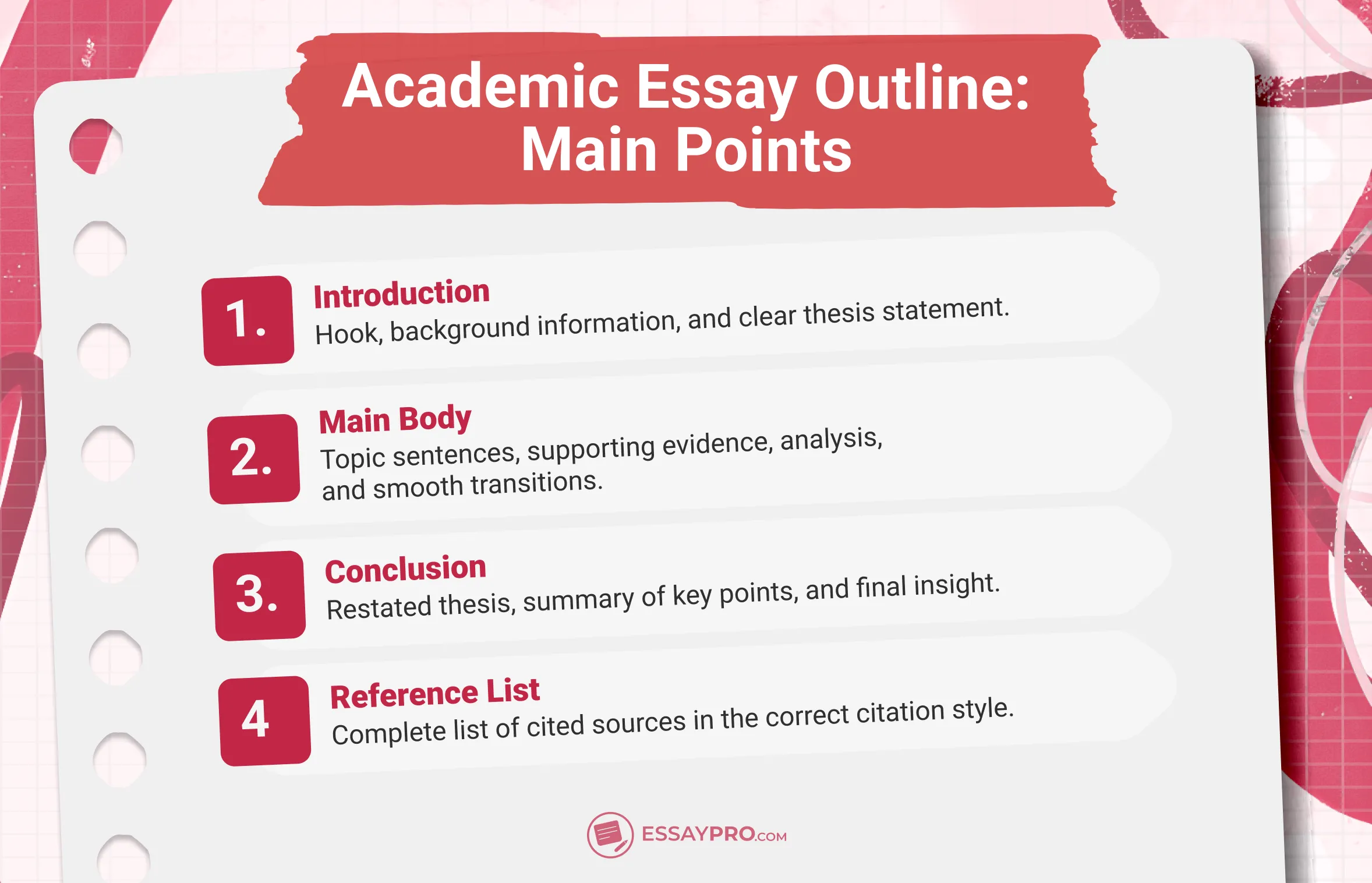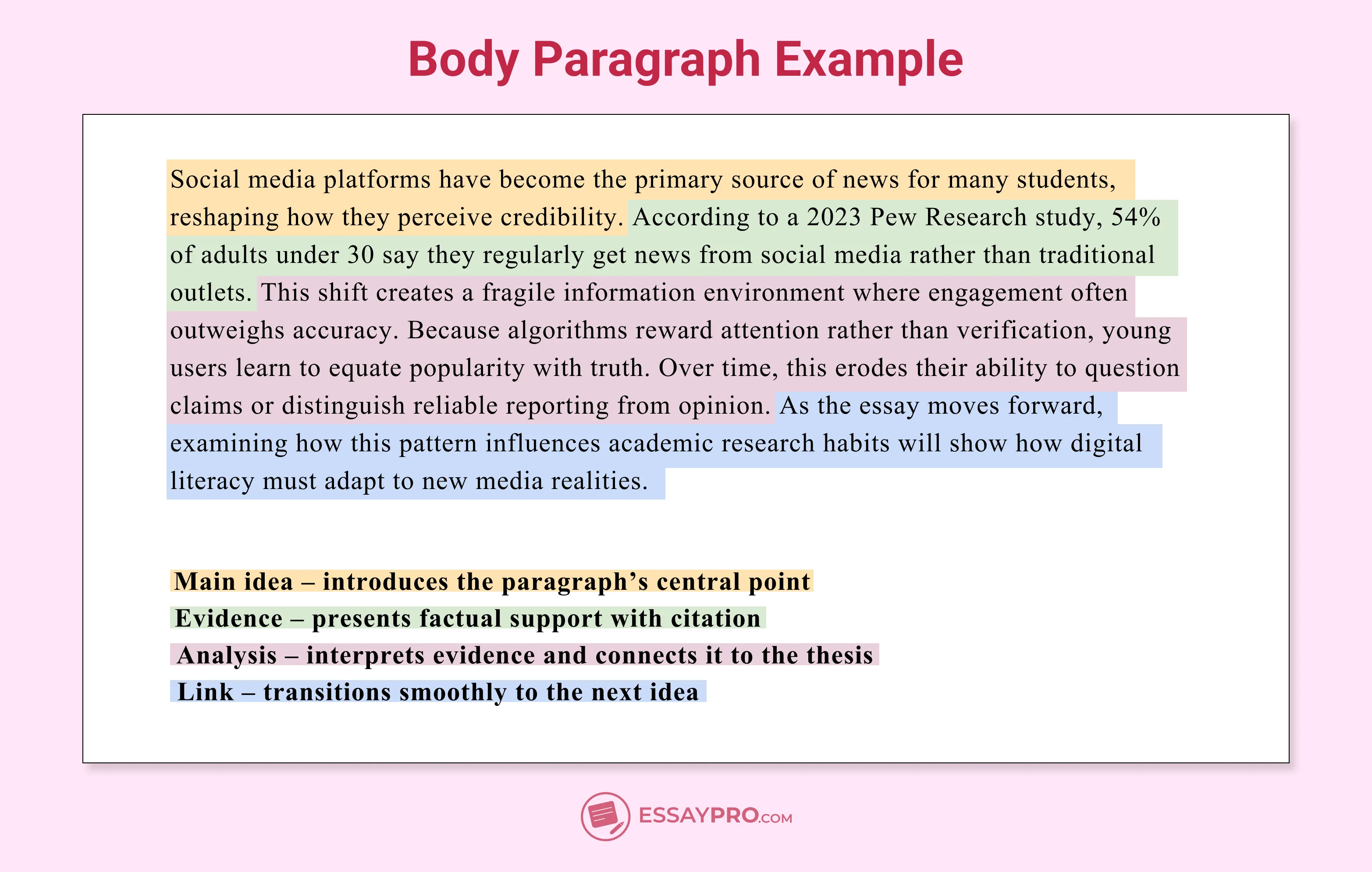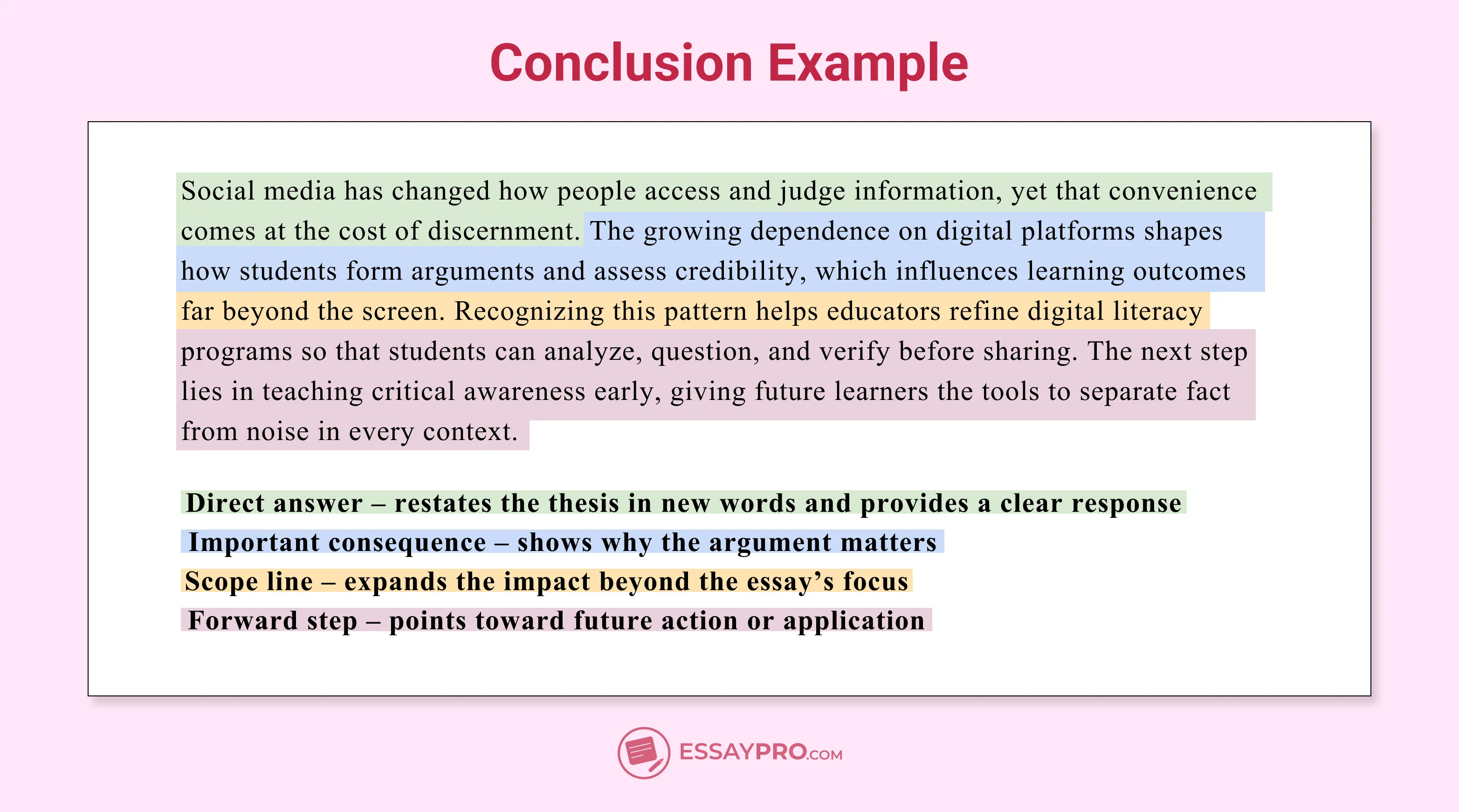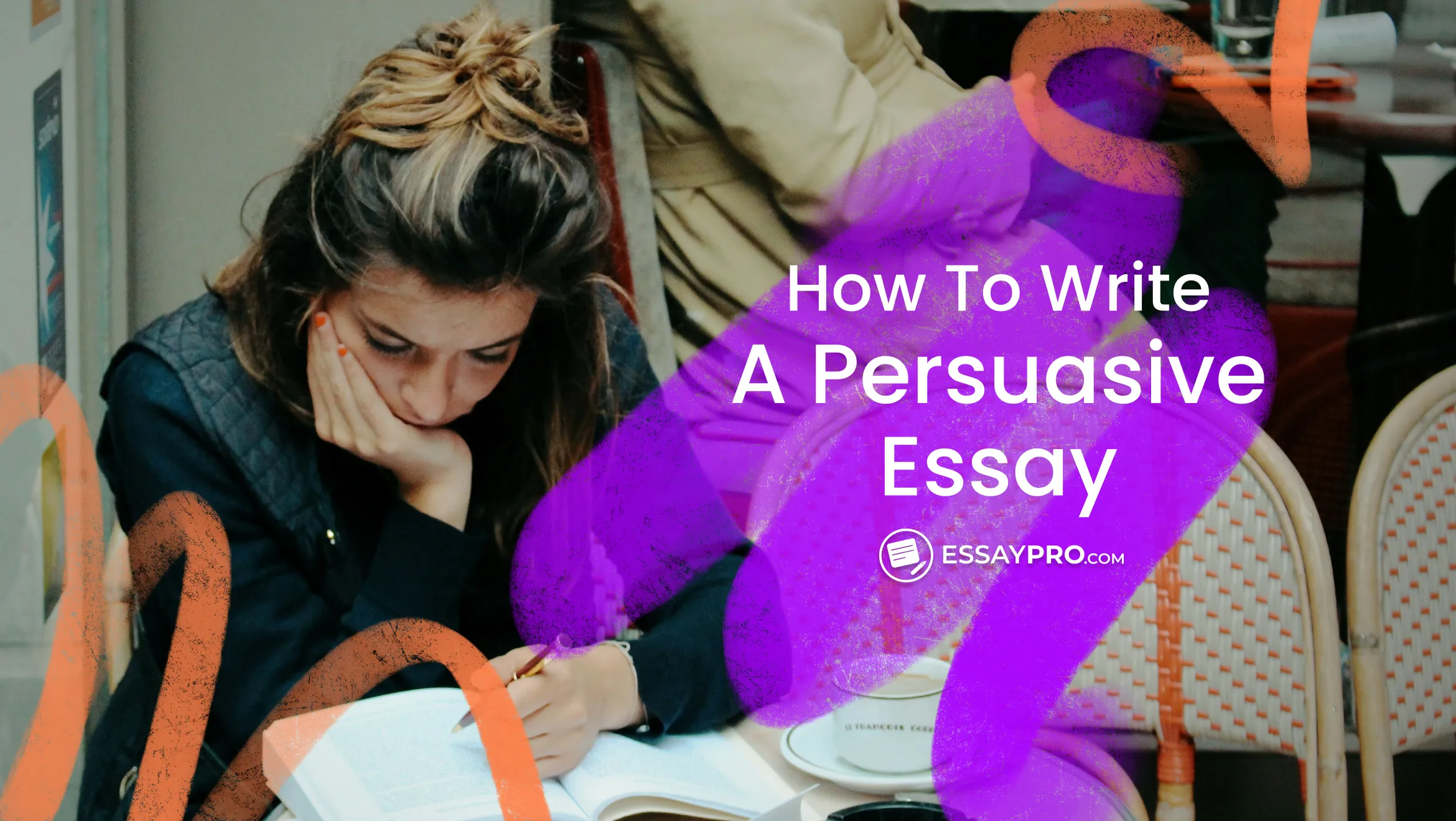An academic essay is a formal writing that organizes an idea or argument through evidence, analysis, and interpretation. There are various types of essays, and their content and word count depend on their level, subject, and course requirements. At university, most essays are argumentative: they are intended to persuade the reader of a certain point of view or argument.
Writing an academic essay is impossible without having the necessary skills to focus and analyze. If you already have enough on your plate, that process can feel daunting. That’s where you can turn to EssayPro. In this article, you’ll find an academic essay sample that will give you a detailed idea of how to write one on your own.
And if you’re still having trouble, our service will connect you to authors who will help you keep moving forward in your academic journey.
Academic Essay Checklist
The checklist below will help you hand in your essay confidently without having to rewrite the draft three times.


Academic Essay Outline
Before we get started on the writing process, here are some academic writing format guidelines to give you a general idea of what it looks like:

1. Introduction
- Hook or opening sentence to capture the reader’s attention
- Background information to give context
- Clear thesis statement that presents the main argument
2. Main Body
- Paragraph 1: Topic sentence stating the main point, followed by supporting evidence, analysis, and a transition to the next point
- Paragraph 2: Topic sentence, evidence, analysis, and transition
- Paragraph 3: Topic sentence, evidence, analysis, and transition
(Add more paragraphs as needed, each focusing on a single point related to the thesis.)
3. Conclusion
- Restate the thesis in new words
- Summarize the key points made in the essay
- End with a final thought or insight that shows the broader importance of the argument
4. Reference List
- Full list of all sources cited in the essay
- Formatted according to the required citation style (APA, MLA, Chicago, etc.)
- Starts on a new page with correct page numbers
Preparing for An Academic Essay
Preparation begins with not quite knowing what you think. That moment isn’t something you rush past.
- First, explore essay topics if you don’t have a specific one assigned to you.
- Instead of just marking key passages, write down the ideas that irritate, moments of curiosity, and the 'why would the author say that?'
- Preparation also means setting limits before you draft. Decide how many words each section deserves, then hold yourself to it.
- Speak your ideas out loud. If your thesis collapses when you try to explain it to your phone, it wasn’t ready for the page.
Preparation, at its core, is noticing where your own thinking catches, not gathering more and more material until you’re feeling drowsy.
Academic Essay Writing Process Explained Video
Before diving into the details of research and drafting, it helps to see creating an academic essay process step by step. Below is a short walkthrough to show you how a strong paper comes to life.
How to Write an Academic Essay in 6 Steps
Take some time before you start writing and sit with yourself for however long you need to really get your head around the assignment. As Xintian Tina Wang on storytelling in essays and applications explains, reflection helps you uncover the personal angle or purpose behind your writing. Once you’ve done that, follow these steps: choose your topic intentionally, research with clear goals, outline with word counts, then write, refine, and tighten.
Step 1: Choose an Essay Topic
Pick a question, not a theme, because the theme will wander, and a question will demand an answer. Shrink the scope with four anchors: time, place, group, lens. For example: How did commuter freshmen at urban colleges in 2022 build civic habits through campus social media?
Now stress-test it:
- Can you answer it with the word count you’ve got?
- Do two credible sources disagree in this zone?
- Can you name the stakes in one sentence that a reader cares about?
None of the answers should feel vague; if they do, narrow them again. Write two titles for the same idea, one technical and one plain. If your job is to persuade your reader, have a look at these persuasive essay topics for inspiration.
Step 2: Conduct Research
Build a source matrix instead of a folder maze. Rows hold claims you might make. Columns hold sources that could support or challenge those claims. Fill cells with page numbers and short notes. You’ll see gaps immediately.
Work both directions in the literature: follow one citation backward to the origin, then jump forward with 'cited by' to see the newest tests of that idea. Keep a counterevidence cache on purpose. Two high-quality sources that push against your position will sharpen the final argument more than ten that nod along. Draft the reference list as you go, so formatting guidelines never derail you at the end.
Step 3: Create an Essay Outline
Outline in sentences, not fragments. When your outline includes one sentence per future paragraph, it forces clarity. Add the word ‘budget’ beside each line. A 1,500-word paper might look like this: 200 for the introduction, 1,100 for the main body, 200 for the conclusion.
Instead of the generic ‘beginning, middle, end’, use a logical sequence that your paragraphs will follow. That should look something like this:
- Establish the problem
- Stake your position
- Address the strongest objection
- Extend the result
Finally, close every section with a pivot sentence, meaning the line that actively sets up the next step. Without those, your essay will feel like it lurches from one block to another.
Step 4: Write the Introduction
Aim for about 10% of the total word count for the introduction. Use one paragraph unless the assignment asks for more. Build it with four beats in this order: context, friction, roadmap, clear thesis statement.
- Context gives one or two lines that place the topic.
- Friction identifies the precise puzzle or weakness in current thinking.
- The road map lays out the sequence you’ll follow, kept tight.
- Thesis statement delivers a claim someone could reasonably push against.
Ban dictionary openings at all times. Give the necessary background information that the reader actually needs, then get to the point.

For more tips on how to write an essay introduction, read our article.
Step 5: Write the Body Paragraphs
Remember MEAL: Main idea, Evidence, Analysis, Link. Make that your paragraph skeleton. Typical length lands between 150 and 250 words, unless, again, your assignment pushes longer sections.
Open with a topic sentence that advances the overall argument. Then, bring evidence with citations that name page numbers or exact data. Spend at least twice as many words on analysis as you spent quoting or paraphrasing, and close with a transition that carries a specific point forward.
Use two control checks. First, ratio check: analysis outnumbers evidence by at least two to one. Second, trace check: someone could trace the logic from paragraph one to the last without a leap.

Step 6: Write the Essay Conclusion
Similarly to the introduction, keep the conclusion to about 10% of the word count in a single, tight paragraph. Do four things: answer the question in fresh language, name the most important implication, state one boundary of your claim, and point to the next inquiry.
- What to include: a direct answer, an important consequence, a scope line, a forward step.
- What to leave out: new sources, brand-new data, apologies, filler phrases.

Academic Essay Examples
Now that you know the process of writing an academic essay from start to finish, it’s time to look at real PDF examples.
If you’re curious about different types of academic essays, visit our article on how to write a descriptive essay.
The Bottom Line
If you follow the steps we’ve provided throughout this article, writing an academic essay will feel less like a maze and more like an exciting challenge. None of the steps is busywork; every move protects your argument from falling apart halfway through.
Still, even with a clear process, students sometimes hit a wall. That’s why EssayPro exists. Here, you can get the assistance and support you need to submit your paper with confidence. You can also explore options to buy a dissertation and see how large-scale research papers are structured.
FAQs
What Is an Academic Essay?
An academic essay is where you take a thesis, in other words, a claim you believe is worth making, and back it up with research, analysis, and interpretation. The aim is to guide a reader through your reasoning so they leave seeing the subject differently.
What Is the Format of an Academic Essay?
The academic essay follows a standard structure, with an introduction stating your thesis, main body paragraphs to build arguments, and a conclusion for a strong ending.
How to Start an Academic Essay?
Give your reader background information and state why the topic is important. Move straight to your thesis and offer a way to prove the problem at hand.

Daniel Parker
is a seasoned educational writer focusing on scholarship guidance, research papers, and various forms of academic essays including reflective and narrative essays. His expertise also extends to detailed case studies. A scholar with a background in English Literature and Education, Daniel’s work on EssayPro blog aims to support students in achieving academic excellence and securing scholarships. His hobbies include reading classic literature and participating in academic forums.
- Institute for Academic Development. (n.d.). Writing. The University of Edinburgh. https://institute-academic-development.ed.ac.uk/study-hub/learning-resources/writing
- University of Toronto Scarborough. (n.d.). How to write an essay. https://utsc.utoronto.ca/dgds/how-write-essay
- Deakin University. (n.d.). Essay writing. https://www.deakin.edu.au/students/study-support/study-resources/study-support-guides/essay-writing








